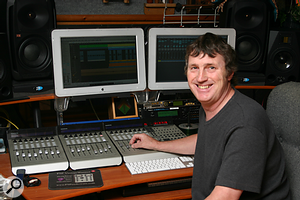The theme for this month's leader evolved after a discussion I had with Craig Anderton at a recent trade show where we were both bemoaning the ephemeral nature of modern software instruments. Craig pointed out that if you bought a violin you could play it today and expect to go on playing it for a long time to come, but if you were to buy a software instrument and then dedicate time to learning to make the most of it, there is no guarantee that it will even survive the next OS update, let alone last for 300 years!
 This may seem an odd criticism given that most of my editorial shows me to be a strong advocate of software instruments, but it's only because I like them so much that I worry about their premature extinction.
This may seem an odd criticism given that most of my editorial shows me to be a strong advocate of software instruments, but it's only because I like them so much that I worry about their premature extinction.
It's evident that some people prefer hardware and some prefer software, but as a sequencer user whose outboard gear is now largely confined to the cupboard of eternal darkness, I have to say that I find soft-synth plug-ins are far easier to use than their hardware counterparts. They nearly always have better audio quality as they use your soundcard's converters and they can access much more waveform memory, to the extent that a single patch may have more sample memory than the whole of a competing high end hardware synth. Their Achilles heel is that, unlike hardware, they can be pirated, and if the company behind them stops bringing in revenue, they can't afford to rewrite the code when a new generation of OS comes along, or when a major player decides to switch from VST to Audio Units. What was a fantastic synth one day could become a worthless CD-ROM the next, though the majority of manufacturers have, to their credit, hung in there and come up with the necessary updates, albeit sometimes not as soon as we'd have liked.
My own view is that the piracy situation is unlikely to get significantly better without draconian measures on behalf of the software companies, and the business of authorising and installing software is already a serious pain in the proverbial. Hardware has at least a measure of permanence — at least as long as MIDI lasts — and unlike software, it never runs out of resources or quits because you've added another plug-in to your mix. The obvious solution to all this is for the hardware synth manufacturers to pursue a greater degree of integration with the sequencing world to the extent that the control panels for their synths appear as plug-ins, the audio is routed into your sequencer's mixer in the same way as a plug-in and the instrument settings are saved in the sequencer song. Some external DSP boxes, such as TC's Powercore, prove this approach can be made to work effectively on a technical level and we're also now seeing external processing boxes that can run conventional VST plug-ins outside the computer.
Perhaps the next logical step for companies who are worried about software piracy is to put their synth engines on hardware cards, then build an external unit to house multiple cards. For this to be successful, we'd have to have a standard platform — there's absolutely no point in a box that only houses one manufacturer's synth cards. The manufacturers agreed on MIDI last century so maybe they can make this their good deed for this century? This external box might usefully include a hardware control surface and would connect to the computer via Firewire so that the reliability and security of hardware could be combined with the user interface and audio routing of a conventional plug-in. At least if the OS did change, only the host unit's interface code would need to be rewritten — there would be no need to redesign all the individual synths.
Even so, I have a feeling that the Stradivarius will have the last word on this one!
Paul White Editor In Chief
